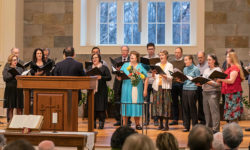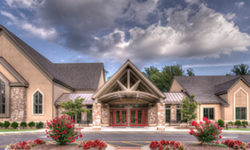
God’s Word and the Pandemic: Part 1
September 24, 2021 | Tracy Troxel
As the people of God it is vitally important that we think about the pandemic in a way that is informed by God’s word. While this will not erase all the differences of opinion in our congregation, we believe that thinking biblically about the pandemic can help us stay unified and focused on God’s priorities during this time. Over the next few days, I will be sharing four items with you that have guided our leadership team in the pandemic:
- Basic biblical principles that have guided the decisions of the pastors, elders, staff, and reopening team through the pandemic.
- Practical ways that we have attempted to balance these priorities throughout the pandemic.
- Lessons that we ought to be learning in the pandemic.
- What to expect moving forward.
Basic Biblical Principles
At Stone Hill Church, the pastors, elders, and their advisers on the reopening team have taken our approach from the whole of Scripture, and we have worked hard to make decisions in light of the following 5 principles:
Caring for Body and Soul
- Acts 20:28 records this exhortation from Paul to the elders in Ephesus: “Pay careful attention to yourselves and to all the flock, in which the Holy Spirit has made you overseers, to care for the church of God, which he obtained with his own blood.” The leaders of any church are responsible to care for the physical and spiritual needs of the congregation.
Deferring to One Another
- Philippians 2:4-5 says, “Let each of you look not only to his own interests but also to the interests of others. Have this mind among yourselves which is yours in Christ Jesus.” Part of what it means to live in community is that we have to learn to sacrifice our interests in order to meet the needs of others. This involves loving sacrifice on everyone’s part. It is interesting that the church is never called to agree on everything. In fact both 1 Corinthians 8 and Romans 14 detail how we are to deal with issues that are not essential doctrines but can divide the church. Both passages call us to love one another, defer to one another and seek unity together.
Loving One Another
- Hebrews 10:24-25 says, “And let us consider how to stir up one another to love and good works, not neglecting to meet together, as is the habit of some, but encouraging one another, and all the more as you see the Day drawing near.” Nearly 50 times in the New Testament the body of Christ is called to personal ministry with one another. We are commanded to love, serve, pray, teach, admonish, confess our sins to one another etc. These are most effectively done in person and yet because of the pandemic we have made many adjustments to our ministry schedule and formats to keep ‘one-anothering’ while trying to provide appropriate safety measures.
Extending the Reputation of Jesus
- Matthew 5:16 says, “Let your light shine before others, so that they may see your good works and give glory to your Father who is in heaven.” We are called to extend and deepen the reputation of Christ before the world. This carries at least two important ramifications.
- First, we have an obligation to love and serve our community. Our actions as a church both collectively and individually do affect the reputation of Jesus Christ. Just as we are not simply individuals but part of the church, we are also part of the larger community of Princeton and we are called to seek its good. (Jeremiah 29:7)
- Second, we are called to be good law-abiding citizens. Many passages call us to obey and defer to legitimately exercised governmental authority. (I Peter 2:13–14)
Seeking and Honoring Truth
- In John 14:6, Jesus proclaimed himself “the way, the truth, and the life.” John tells us that Jesus, as the Word incarnate, dwelt among us “full of grace and truth.” John also tells us that the evil one, the enemy of our souls, is “a liar and the father of lies.” Stone Hill Church was founded out of a special concern to uphold the truth of God’s Word, and through the decades God has blessed us by preserving that commitment. This is one of the reasons why we have historically been a church with a strong apologetic presence in an academically rigorous community, while never compromising Biblical faith. Increasingly, we live in a culture where competing truth claims and a fractured information environment make it hard to know who or what to trust. This makes the work of truth-seeking not only more difficult, but also more necessary, than ever before.






